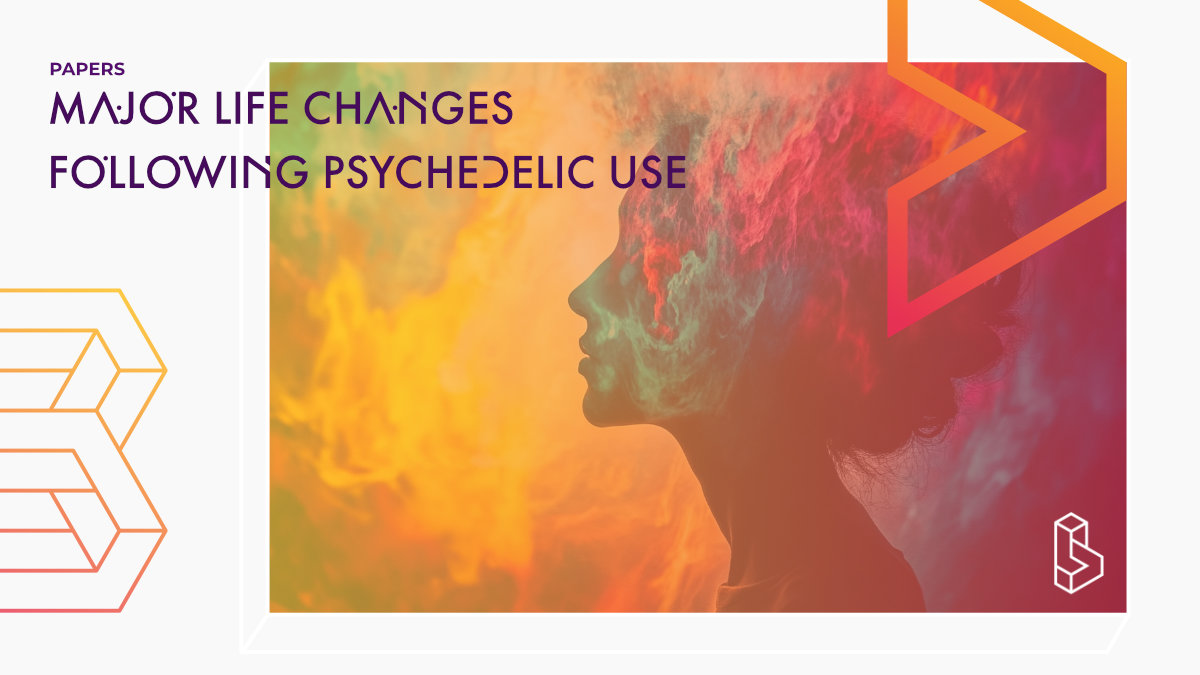This pre-print survey (n=581) evaluates the Psychedelic-related Major Life Changes Questionnaire (P-MLCQ) in people reporting naturalistic psychedelic use. It finds that 82.96% of participants reported major life changes in at least one domain, including goals (53.7%), values (53.53%), and spirituality (49.05%), with changes rated highly positively (M = 4.64/5). Frequency of use correlated with more changes (r = 0.34), while education level was negatively associated with the number of changes (β = -0.137).
Abstract of Major life changes following psychedelic use
“Background: Psychedelic drugs show promise in facilitating a variety of long-term psychological changes, but they may also lead to unexpected major life changes that have not been captured by measures typically used in clinical trials.
Aim: We aimed to develop a survey instrument that can characterize the quality and self-appraisal of psychedelic-related major life changes.
Method: The Psychedelic-related Major Life Changes Questionnaire (P-MLCQ) was created to assess psychedelic-related major life changes across 10 different domains. We evaluated the survey in people reporting naturalistic psychedelic use (N = 581).
Results: 482/581 participants (82.96%) reported a major life change in at least one domain influenced by their psychedelic use (M = 3.29, SD = 2.60), including changes in Goals (53.70%), Values (53.53%), Religion/spirituality (49.05%), Social activities (37.01%), Eating habits/diet (34.08%), Occupation/Line of work (32.36%), Hobbies (29.43%), Political views (14.97%), Sexuality (13.08%), and Marital status or a non-marital partner change (12.22%). Major life changes were rated highly positively (M = 4.64, SD = 0.61 on a 5-point scale). There was a positive relationship between frequency of psychedelic use over the last five years and total number of psychedelic-related major life changes (r = 0.34, p < .001). Education level was negatively associated with the total number of psychedelic-related major life changes endorsed (β = -.137, p < .01).
Conclusion: Our results support that psychedelic use can be followed by major life changes. Future research is needed to examine the generalizability of these results in representative samples that are less susceptible to positive bias.“
Authors: Jacob S. Aday, Nicolas G. Glynos, Anne Baker, Niloufar Pouyan, Julie Barron, Moss Herberholz, Daniel Kruger, Joshua D. Woolley & Kevin F. Boehnke
Summary of Major life changes following psychedelic use
The study investigates major life changes influenced by psychedelic use, focusing on the limitations of conventional clinical measures that may overlook profound shifts in life domains such as careers, relationships, and personal values. Psychedelic substances, including MDMA, ayahuasca, ketamine, and others, have demonstrated potential to catalyse significant psychological changes. Reports from both clinical trials and naturalistic use hint at these transformative experiences, but systematic assessments have been scarce.
The authors designed the Psychedelic-related Major Life Changes Questionnaire (P-MLCQ) to evaluate life changes across ten domains, including goals, values, spirituality, and political views. Prior research underscores the lasting impact of psychedelics on traits such as openness to experience, cognitive flexibility, and identity. Such changes are hypothesised to be facilitated by the neuroplastic effects of psychedelics, which may make individuals more receptive to context and external inputs. Despite anecdotal evidence, systematic studies on these phenomena remain limited, prompting the need for a dedicated survey tool to explore these effects.
Methods
Participants and Recruitment
Find this paper
http://dx.doi.org/10.13140/RG.2.2.29745.80489
Open Access | Google Scholar | Backup | 🕊
Cite this paper (APA)
Aday, J. S., Glynos, N. G., Baker, A., Pouyan, N., Barron, J., Herberholz, M., ... & Boehnke, K. F. Major life changes following psychedelic use: A retrospective survey among people using psychedelics naturalistically.
Study details
Participants
581
Humans

